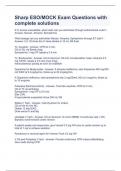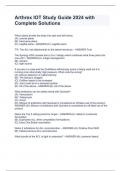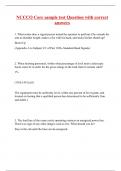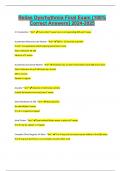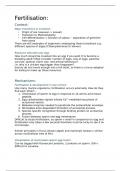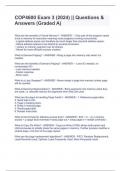PERSONALITY PSYCHOLOGY:
DIFFERENCES BETWEEN PEOPLE
1.2 C
JIM LEFERINK OP REININK
ERASMUS UNIVERSITY ROTTERDAM
Psychology, Ba-1, 2017-2018
, SUMMARY DIFFERENCES BETWEEN PEOPLE
TABLE OF CONTENTS
GENERAL OVERVIEW OF PERSONALITY PSYCHOLOGY.................................................................... 3
PROBLEM 1: INNER DRIVES .......................................................................................................... 5
FREUD’S PSYCHOANALYTIC PERSPECTIVE ......................................................................................................5
ID, EGO, SUPEREGO ..................................................................................................................................9
PSYCHOSEXUAL DEVELOPMENT ................................................................................................................ 12
PROBLEM 2: EXTERNAL FORCES .................................................................................................. 13
CLASSICAL CONDITIONING ....................................................................................................................... 13
OPERANT CONDITIONING ........................................................................................................................ 15
PROBLEM 3: SELF-ACTUALISATION OR LEARNING ....................................................................... 18
SELF-ACTUALISATION ............................................................................................................................. 18
OBSERVATIONAL LEARNING ..................................................................................................................... 21
PROBLEM 4: BRAINPOWER......................................................................................................... 25
IMPLICIT THEORIES OF INTELLIGENCE......................................................................................................... 25
EXPLICIT THEORIES OF INTELLIGENCE......................................................................................................... 27
FLYNN EFFECT ....................................................................................................................................... 31
PROBLEM 5: PERSONALITY TRAITS.............................................................................................. 33
TRAIT THEORY’S VIEW OF THE PERSON...................................................................................................... 33
TRAIT THEORIES .................................................................................................................................... 35
Gordon W. Allport (1897-1967) ..................................................................................................... 36
Raymond B. Cattell (1905-1998) ................................................................................................... 38
Hans J. Eysenck (1916-1997) ......................................................................................................... 39
PROBLEM 6: (IN)STABILITY OF BEHAVIOUR ................................................................................. 40
TRAITS AND SITUATIONS ......................................................................................................................... 40
PERSONALITY DEVELOPMENT, STABILITY, AND CHANGE ............................................................................... 44
PROBLEM 7: NATURE OR NURTURE? .......................................................................................... 48
TEMPERAMENTS .................................................................................................................................... 48
BEHAVIOURAL GENETIC STUDIES .............................................................................................................. 50
NATURE-NURTURE DEBATE ..................................................................................................................... 54
PROBLEM 8: PERSONALITY IN SOCIAL AND CULTURAL CONTEXT ................................................. 58
SOCIAL INTERACTION AND PERSONALITY .................................................................................................... 58
SEX, GENDER, AND PERSONALITY ............................................................................................................. 62
CULTURE AND PERSONALITY .................................................................................................................... 66
BIBLIOGRAPHY........................................................................................................................... 69
2
,GENERAL OVERVIEW OF PERSONALITY PSYCHOLOGY
Personality – “The set of psychological traits and mechanisms within the individual that are organised and
relatively enduring and that influence his or her interactions and adaptations to the environment” (G. Allport)
The four temperaments of Hippocrates (370 B.C.) – Consists of four humors (i.e. bodily fluids) that affect health
and personality. Later, obviously, biochemistry proved Hippocrates’ theory wrong.
• Sanguine (blood): prone to optimism;
• Choleric (yellow bile): prone to anger;
• Phlegmatic (mucus): prone to apathy;
• Melancholic (black bile): prone to sadness.
Astrology – Personality is influenced by the relative position of the planets at the time of birth. The horoscope
originated in Egypt (5th century B.C.). This is often considered as a pseudo-science, because it uses vague,
untestable language and scientific tests fail to support astrology’s claims. Moreover, it makes extensive use of
the Forer-effect or Barnum-effect (Forer, 1948): Individuals will give high accuracy ratings to descriptions of
their personality that supposedly are tailored specifically to them but that are, in fact, vague and general enough
to apply to a wide range of people. The Forer-effect is a specific example of the so-called acceptance
phenomenon, which describes the general tendency of humans “to accept almost any bogus personality
feedback”.
Phrenology (Gall, 1796) – Contours of the skull correspond to the underlying shape of the brain, from which we
can derive certain personality traits. Obviously, this theory has also been proved to be wrong, but it paved a way
for neuropsychology.
Somatotype theory (Sheldon, 1940) – States that body type and personality are correlated: Endomorphs tend
to be friendly and outgoing, mesomorphs tend to be more aggressive, and ectomorphs tend to be more shy and
secretive. Obviously, this is a very weak empirical methodology.
Personality psychology – The scientific study of human universals, individual differences, and individual
uniqueness, which carries out research, makes assessments, and develops theories. Its research consists of three
main research areas:
1. Personality structure: What are the basic units, or the stable, enduring aspects, of personality?
2. Personality development: How do we develop into the persons we are?
3. Personality processes: Why do we behave in a certain way? What are the dynamic aspects of
personality? What motives our behaviour?
Four major perspectives on personality can be distinguished:
1. Psychoanalytical perspective (Freud): unconscious internal processes influence behaviour; childhood
experiences have an impact on personality development.
2. Behaviourist perspective (Watson, Skinner): external stimuli (reward and punishment) influence
behaviour and result in learned behaviour; if the environment is changed, personality will change.
3. Humanistic perspective (Rogers): self-esteem is central to personality; people are innately good and
have a positive self-concept; childhood experiences and evaluations by others affect our self-esteem;
personality development is based on our desire to grow and improve (i.e. self-actualisation).
4. Social cognitive learning perspective (Bandura): social environment and cognition influence behaviour;
people learn by observing important others (i.e. models); cognitive processes such as attention,
retention, reproduction, and motivation affect imitation.
3
, The most important aspects on which individuals differ are (1) intelligence and (2) personality traits. The major
points of discussion in personality psychology are (1) whether personalities are stable and consistent across
situations and over time, and (2) whether personality is mainly inherited or determined by the environment
(nature-nurture debate).
4



